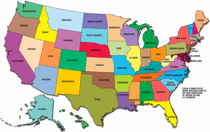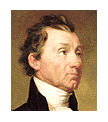
US Presidents (POTUS)
The American President is widely considered to be the most powerful person on the earth, and is usually one of the world's best-known public figures.
 James
Monroe
James
Monroe
5th President of the United States
(March 4, 1817 to March 3, 1825)
Nicknames:
-
"The Last Cocked Hat"
-
"Era-of-Good-Feeling President," "The Era of Good Feelings" was the period following the War of 1812, during which America became less divided politically, to the extent that the only opponents of the ruling Democratic Republicans, the Federalist Party, went out of existence. It was not until resistance to Andrew Jackson's policies produced the Whig Party that oppositional politics resumed in the United States
James Monroe
Born: April 28, 1758, in Westmoreland County, Virginia
Died: July 4, 1831, in New York, New York
Father: Spence Monroe
Mother: Elizabeth Jones Monroe
Married: Elizabeth "Eliza" Kortright (1768-1830), on February
16, 1786
Children: Eliza Kortright Monroe (1786-1835); James Spence Monroe
(1799-1800); Maria Hester Monroe (1803-50)
Religion: Episcopalian
Education: Graduated from College of William and Mary (1776)
Occupation: Lawyer
Political Party: Democratic-Republican
Other Government Positions:
- Member of Continental Congress, 1783-86
- United States Senator, 1790-94
- Minister to France, 1794-96
- Governor of Virginia, 1799-1802
- Minister to France and England, 1803-07
- Secretary of State, 1811-17 (under Madison)
- Secretary of War, 1814-15 (under Madison)
James Monroe Biography
On New Year's Day, 1825, at the last of his annual White House receptions,
President James Monroe made a pleasing impression upon a Virginia lady
who shook his hand:
"He is tall and well formed. His dress plain and in the old style....
His manner was quiet and dignified. From the frank, honest expression
of his eye ... I think he well deserves the encomium passed upon him
by the great Jefferson, who said, 'Monroe was so honest that if you
turned his soul inside out there would not be a spot on it.' "
Born in Westmoreland County, Virginia, in 1758, Monroe attended the
College of William and Mary, fought with distinction in the Continental
Army, and practiced law in Fredericksburg, Virginia.
As a youthful politician, he joined the anti-Federalists in the Virginia
Convention which ratified the Constitution, and in 1790, an advocate
of Jeffersonian policies, was elected United States Senator. As Minister
to France in 1794-1796, he displayed strong sympathies for the French
cause; later, with Robert R. Livingston, he helped negotiate the Louisiana
Purchase.
His ambition and energy, together with the backing of President Madison,
made him the Republican choice for the Presidency in 1816. With little
Federalist opposition, he easily won re-election in 1820.
Monroe made unusually strong Cabinet choices, naming a Southerner, John
C. Calhoun, as Secretary of War, and a northerner, John Quincy Adams,
as Secretary of State. Only Henry Clay's refusal kept Monroe from adding
an outstanding Westerner.
Early in his administration, Monroe undertook a goodwill tour. At Boston,
his visit was hailed as the beginning of an "Era of Good Feelings."
Unfortunately these "good feelings" did not endure, although Monroe,
his popularity undiminished, followed nationalist policies.
Across the facade of nationalism, ugly sectional cracks appeared. A
painful economic depression undoubtedly increased the dismay of the
people of the Missouri Territory in 1819 when their application for
admission to the Union as a slave state failed. An amended bill for
gradually eliminating slavery in Missouri precipitated two years of
bitter debate in Congress.
The Missouri Compromise bill resolved the struggle, pairing Missouri
as a slave state with Maine, a free state, and barring slavery north
and west of Missouri forever.
In foreign affairs Monroe proclaimed the fundamental policy that bears
his name, responding to the threat that the more conservative governments
in Europe might try to aid Spain in winning back her former Latin American
colonies. Monroe did not begin formally to recognize the young sister
republics until 1822, after ascertaining that Congress would vote appropriations
for diplomatic missions. He and Secretary of State John Quincy Adams
wished to avoid trouble with Spain until it had ceded the Floridas,
as was done in 1821.
Great Britain, with its powerful navy, also opposed reconquest of Latin
America and suggested that the United States join in proclaiming "hands
off." Ex-Presidents Jefferson and Madison counseled Monroe to accept
the offer, but Secretary Adams advised, "It would be more candid ...
to avow our principles explicitly to Russia and France, than to come
in as a cock-boat in the wake of the British man-of-war."
Monroe accepted Adams's advice. Not only must Latin America be left
alone, he warned, but also Russia must not encroach southward on the
Pacific coast. ". . . the American continents," he stated, "by the free
and independent condition which they have assumed and maintain, are
henceforth not to be considered as subjects for future colonization
by any European Power." Some 20 years after Monroe died in 1831, this
became known as the Monroe Doctrine.
Source: http://www.whitehouse.gov/

US Presidents: Life & Accomplishments



